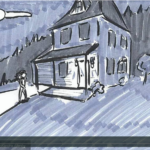
JENNY KENNEDY
RMIT University
ROWAN WILKEN
RMIT University
[s2If current_user_can(access_s2member_level1)]
[/s2If]
[s2If !is_user_logged_in()]
Please sign in or become an EPIC Member to access video.
[/s2If]
[s2If current_user_is(subscriber)]
Become an EPIC Member to access video:
→ Learn about Membership
→ Browse Video Library
[/s2If]
Overview
This tutorial explores research in people’s homes through digital methods. The instructors focus on how to utilize participant’s existing digital skills and materials to undertake ethnographic research on and in their home environment, and develop a greater awareness of how geographical and socio-economic circumstances impact the research process. Participants collaborate to discuss how understanding of domestic contexts might frame our research design and specific methods, and consider ways for enhancing the collaborative and participatory process of data collection in the domestic space.
This tutorial was presented in full at EPIC202020. The video includes...

